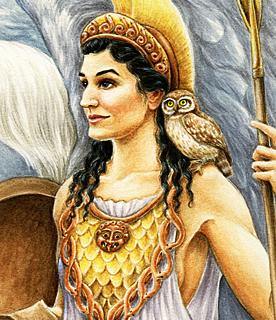Epic poems reflect a culture’s values. The female characters in Homer’s poem, The Odyssey, reflect the ancient Greek values of helpfulness, loyalty, and cleverness. Athena is a character who represents helpfulness.
At the beginning of the story, she offers advice to help Telemachus persuade the suitors to leave Odysseus’s palace. Athena advises, “At daybreak call the islanders to assembly, and speak your will, and call the gods to witness.” (page 724, lines 54 + 55). She wants to help Telemachus get the suitors out of Odysseus’s palace because she knows Odysseus is still alive and cares for his son.
This is only one of the many times Athena shows how helpful she can be. Through the character of Circe, the important lesson of loyalty is shown. Odysseus gives into temptation and shows how he is disloyal.
Odysseus is convinced by “Circe ‘Loveliest of all immortals’ … to stay… and restore his heart” (page 761, in-between lines 1050 + 1055). Circe temps Odysseus to be disloyal to Penelope because he can’t refuse a goddess. Circe is a temptress and because Odysseus gives in to it, this leads him down into more trouble in the long run with Scylla and Charybdis.
Cleverness is shown in Penelope when she tells the suitors she will choose a new husband when she finished weaving the shroud for Odysseus.
Homer writes, “So every day she wove on the great loom- but every night by torchlight she unwove it; and so for three years, she deceived the Achaeans” (page 726, lines 108 – 110).
This is clever of Penelope because it allows more time for Odysseus to return home without anyone knowing about it. She is clever at many times throughout the poem and that is also one of the reasons the suitors want to marry her.
This story helps reveal the false notion that women are the source of evil. Homer helps show to the people of Greece and the rest of the world that many women have some great qualities, such as helpfulness, loyalty, and cleverness, and are just as good as men.


I agree
Thank you for this
same